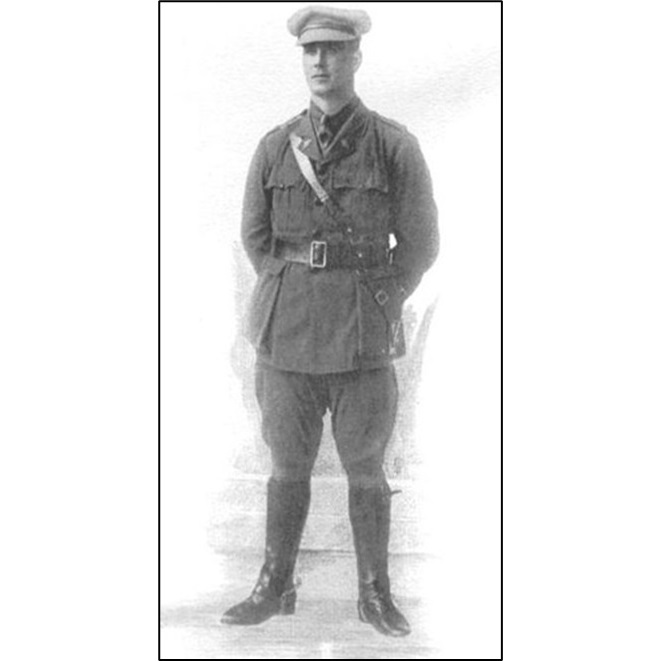This week in the history of Gordon Cricket – 19 August 1917 – Reg Black Jnr
Gordon District Cricket Club | August 23, 2024

Author: Paul Stephenson
The news of a Military Cross was usually received with great pride by the Anzac Mounted Division, however on August 19, 1917, the despatch was received one hour after the news that Lieutenant Reg Black had died from wounds received the day before while on patrol near Um Urgan in Palestine. Reg was buried at the Rafa Military Cemetery and had been the first Gordon cricketer to enlist in the First World War in December 1914.
Reg Jr was born in Sydney and educated in his senior school years at the Sydney Church of England Grammar School, North Sydney. However, he had spent a lot of his childhood in Mudgee where his father represented the district as a member of the NSW Legislative Assembly. It was here he gained his expertise as a horseman. Reg played several games for Gordon in its City and Suburban team in 1905 and 1906 before he left Sydney to live near Boggabri, having bought Jeralong Station in the Liverpool Plains district of Northern NSW. Reg Junior was the son of the Hon Reginald James Black, a Director of the Bank of NSW and the first President of the Gordon District Cricket Club. He would remain in that role until his death in 1928 and is still to this day the longest serving president of the club.
Having prepared for the war in Sydney with the 6th Light Horse Regiment, Reg certainly would not have envisaged arriving at Gallipoli to play the role of an infantry private only a few months later. Reg and the other members of the 6th Light Horse dug tunnels under the Turkish positions opposite Lone Pine and Johnstone’s Jolly, and built a trench system at Chatham’s Post. They also took part in two feint attacks in the area in June and July and sustained some casualties as well as undergoing a fierce attack when the Turks attempted to occupy the trenches they had built. While several members of the regiment were killed or wounded, Reg was fortunately uninjured.
After the Gallipoli Campaign, Reg and his fellow light horse troops would have expected at least a brief rest in Egypt. However, mounted men were urgently needed for the defence of the Delta against the Senussi, a religious sect resident in Libya and Egypt, who had been courted by the Ottoman and German Empires. In the summer of 1915, the Ottomans persuaded the Grand Senussi Ahmed Sharif es Senussi, to raise a jihad, attack British-occupied Egypt from the west and encourage insurrection in Egypt.
While having fought in several battles during 1916, Reg was finally recognised for his gallantry by being mentioned in Despatches by General Sir AJ Murray, Commander-in-Chief of the Egypt Expeditionary Forces in the Battle of Romani which was fought between the 3 to 5 August 1916 against a joint Ottoman and German force. They had marched across the Sinai in a final attempt to defend their hold on the Suez Canal which they had held since January 1915.
In the following year, on the night of 30 July, Reg Black was faced with a situation that would clearly define what we already know about the character of this fine Australian. For his actions, Reg received the Military Cross. The citation read:
Regiment: 6th Light Horse Regiment
Brigade: 2nd Light Horse Brigade
Division: Anzac Mounted Division
Date of Recommendation: 19/8/17
Rank and name: Lieutenant Reginald James Black, MC
Action for which commended:
For gallantry on the night of 30/31st July, 1917, when his regiment proceeded to Kh Imleih with a view to making a reconnaissance towards Irgeig. On arrival at Kh Imleih, one squadron went on dismounted toward Irgieg and Lieutenant Black with one troop was sent to point 730, also dismounted. Regional headquarters was connected by telephone to the advance squadron and Lieutenant Black.
After the dismounted parties had gone two hours Lieutenant Black sent word by “buzzer” that a column of enemy, estimated at one battalion and two squadrons of mounted men, were moving between him and Regimental Headquarters, travelling towards Beersheba.
The situation was extremely grave, for if the enemy had discovered the presence of our troops, it meant the absolute loss of the advance squadron as well as Lieutenant Black’s troop. Although the enemy was passing for two hours, and some went within fifteen yards of his post, he kept his men under complete control and sent back full information of the enemy movement, which enabled the advance squadron to be recalled and directed by the safest route. By his extreme coolness and control over his men, and his continued attention to communications, although cut off from all support, this officer without doubt saved a critical situation, which would have involved the Regiment in an unequal fight that would have caused very heavy losses.
Subsequent reports obtained from Prisoners of War confirm the information by this officer, that large bodies of the enemy were using this route toward Beersheba
The news back home was devastating for the Black family, after having heard of him surviving the horrors of Gallipoli and then the major Eastern front battles of Romani, Rafa, Magdhaba, Bir el Masar and Gaza. The Sydney Morning Herald broke the news after the family was told on 22 August 1917. While Reg hadn’t played a lot of cricket with Gordon, his father would continue in his role as President of the club a further eleven years.








